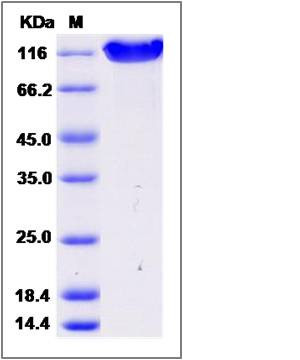Rat NCAM1 / CD56 Protein (His Tag)
NCAM1, Ncam
- 100ug (NPP1663) Please inquiry
| Catalog Number | P80399-R08H |
|---|---|
| Organism Species | Rat |
| Host | Human Cells |
| Synonyms | NCAM1, Ncam |
| Molecular Weight | The recombinant rat NCAM1 comprises 713 amino acids and predicts a molecular mass of 79.2 kDa. The apparent molecular mass of the recombinant protein is approximately 114-118 kDa in SDS-PAGE under reducing conditions due to glycosylation. |
| predicted N | Leu 20 |
| SDS-PAGE |  |
| Purity | > 95 % as determined by SDS-PAGE |
| Protein Construction | A DNA sequence encoding the rat NCAM1 (P13596-1) (Met1-Thr721) was expressed with a polyhistidine tag at the C-terminus. |
| Bio-activity | |
| Research Area | Cancer |Invasion microenvironment |Angiogenesis |Cytokine & Receptor |Transforming Growth Factor Beta (TGF-beta) Superfamily |TGF-beta Superfamily Receptors | |
| Formulation | Lyophilized from sterile 50 mM Tris, 0.15M NaCl, pH 8.0. 1. Normally 5 % - 8 % trehalose and mannitol are added as protectants before lyophilization. Specific concentrations are included in the hardcopy of COA. |
| Background | NCAM1, also known as CD56, is a neural adhesion protein (NCAM) which belongs to the immunoglobulin superfamily. NCAM is involved in neural development and in plasticity in the adult brain. UCHL1 is a novel interaction partner of both NCAM isoforms that regulates their ubiquitination and intracellular trafficking. NCAM1 is a cell adhesion molecule involved in neuron-neuron adhesion, neurite fasciculation, outgrowth of neurites, etc. NCAM1 has also been shown to be involved in the expansion of T cells and dendritic cells which play an important role in immune surveillance. |
| Reference |
